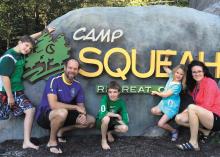Mention “church camp” and many people might think of camping or volunteering there a summer or two. But for Rob Tiessen, executive director of Mennonite Church B.C.’s Camp Squeah, camp has meant a decades-long experience.
Growing up in Vancouver’s Sherbrooke Mennonite Church, Tiessen faithfully attended summer camp at Squeah throughout his childhood and youth.
In 1991, he was invited to apply for a male counsellor position at Squeah and found it a place to match his gifts and passions.
When a position for full-time program director opened up, he pursued a bachelor of religious education degree at Northwest Baptist Seminary/Trinity Western University in Langley, B.C., taking recreation courses that would complement a camp leadership position. Then he earned a master’s degree from ACTS Seminaries.
He was hired as the program director 25 years ago, in 1997, and, in 2006, when the previous executive director left the position, Tiessen was hired and has served in that role in ever since.
Recently, he reflected on his time at camp, and how the camping experience has changed, as well as how camp has affected him personally.
Amy Rinner Waddell: What changes have you observed over the years in terms of the kids who come, the camp programs, general trends in church camping?
Rob Tiessen: Early on, the majority of campers came from MC B.C. homes. Over the years, the camper demographic has certainly shifted towards the majority of campers being Christian from a variety of different churches and denominations, to more and more coming from homes with no significant faith connection.
This has challenged our creativity in terms of how to share God’s love and the gospel story in relevant ways to such a diverse audience who are entering the story from so many different points of awareness.
B.C. Camping Association standards have been updated over the years, designed with one goal in mind: improve camper safety. This has necessarily added various layers of protection and supervision throughout numerous areas of camp programming and operation. Our summer staff community must now be significantly larger, and better trained, than in the early days of camping, to ensure adequate, safe supervision.
ARW: What do you think the importance is of church camps in general? How have you observed the camping experience has changed or affected the young people who have attended?
RT: Faith-based camps offer a unique setting away from the daily routines of “normal” life, where kids are given opportunity to escape preconceived labels and explore life and relationships in a natural setting . . . surrounded by a community of leaders who share the love of Jesus with them. Programming designed to invest in their development fosters healthy images of self, and encourages growth in self-esteem as well as leadership development.
At Squeah, we particularly value and place emphasis on spending time in the natural environment of God’s creation. We cherish the sights, sounds and smells of nature, and we encourage a deeper connection with our Creator throughout the experience.
Time and time again I hear from churches that the young adults who commit to baptism share in their testimony that it was a significant life-changing, faith-forming experience at camp that influenced a deeper commitment to follow Jesus as their Lord and Saviour, and ultimately to this step of obedience.
ARW: What’s it like raising a family at church camp?
RT: Raising a family at camp comes with incredible blessings and joys, as well its fair share of challenges.
It’s a great environment and community to raise children in, with so many positive, energetic role models to look up to. The natural environment, with all of the activities, trails, field, etc., are a parent’s dream when it comes to encouraging your kids away from TV and computer screens.
It’s a great place for the kids to develop their social skills as youngsters and then continue to develop their leadership abilities as they get opportunities to serve in various areas of camp.
I’ve been incredibly blessed to have such an amazing life partner, in my wife Kim, to share this journey with. Her support and commitment to Squeah’s ministry cannot be overstated. She is a main reason I’ve made it these 25 years.
ARW: How has your time at Squeah affected you and your perspective in life or faith?
RT: Over the past 25 years, I’ve been challenged time and time again to consider and acknowledge a situation from a different perspective. To embrace the mystery of God rather than only be satisfied with that which I can explain.
Nature is a wonderful teacher in this regard. It is not controllable. It can be fierce and unrelenting one moment, then peaceful and serene the next. This has served to emphasize my perspective on being a lifelong learner. I’m daily more aware of my need for God’s grace, love and mercy, and pray I spend more time extending that same grace and love to others than worrying about being right or wrong in our decisions and actions.
ARW: What do you see as the future of church camps, and what is your continued vision for Camp Squeah?
RT: Especially coming out of COVID-19, I see camp as the perfect place for churches to rebuild community in the body which has been segregated by this pandemic.
There’s something special that happens in terms of relational connections when people step out of their routine hustle and bustle to set aside time devoted to connecting with one another in a special place and space that is camp.
It remains our vision to continue stewarding Camp Squeah, in response to God who loves and calls us, as a place of refuge in a natural setting, where people of all ages can build relationships, grow and be nurtured.
I feel blessed to have been supported along this journey by so many gifted and talented servant-hearted brothers and sisters.
Do you have a story idea about Mennonites in B.C.? Send it to Amy Rinner Waddell at bc@canadianmennonite.org.




Add new comment
Canadian Mennonite invites comments and encourages constructive discussion about our content. Actual full names (first and last) are required. Comments are moderated and may be edited. They will not appear online until approved and will be posted during business hours. Some comments may be reproduced in print.